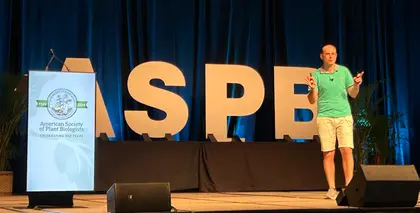
Palo Alto, CA—Carnegie Science algal specialist Adrien Burlacot is one of five early career scientists selected to give spotlight presentations at the American Society of Plant Biologists’ centennial annual meeting this week.
The ASPB Scholars program honors future leaders in the field who are advancing novel science directions, including graduate students, postdoctoral fellows, early assistant professors, and their counterparts in government and corporate laboratories. The recognition highlights those whose work focuses on topics that are unique to plant science, including photosynthesis, plant cell biology, plant genomics, plant cell wall formation, and more.
“Over the last 100 years, plant biologists have provided critical insights into our understanding of key biological concepts, including the fundamental nature of genes and cells,” ASPB said when it launched the ASPB Scholars program for 2024, expressing a desire to “highlight ground-breaking research performed by the next generation of plant scientists that builds upon the incredible insights gained over the last 100 years of research.”
Burlacot, a member of Carnegie Science’s prestigious Staff Associate program, which was designed to empower outstanding early career scientists, enabling them to pursue the kind of bold, creative research laid out in our founding mission.
For the last couple of years, his lab has studied the photosynthetic process by which plants, algae, and certain bacteria can convert the Sun’s energy into sugars and fats. Algae are much more efficient at accomplishing this biochemical task, and Burlacot’s lab investigates the molecular basis of this productivity with a particular focus on the energy that powers algae’s superior photosynthetic abilities.
Understanding and harnessing this algal “super-power” could improve the productivity of agricultural crops, fighting world hunger, and enhance our ability to capture and sequester carbon pollution from the atmosphere.
Burlacot and the other selected scholars presented their research Monday during a special plenary session.
“I feel humbled to be part of such an amazing crowd of plant scientists,” Burlacot said. “Thank you to the ASPB for this recognition of the work that my team is doing and the ways we are undertaking new approaches to understanding photosynthetic efficiency that could contribute to making the world a better place.”
